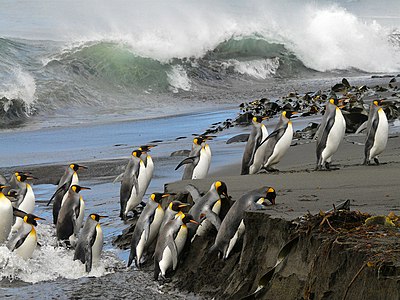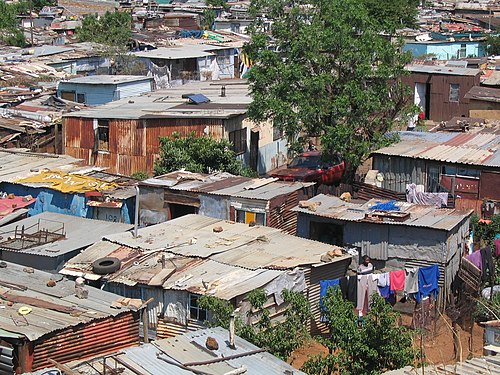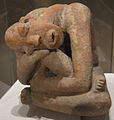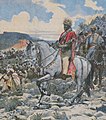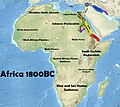Portal:Africa



Africa is the world's second largest and second-most populous continent after Asia. At about 30.3 million km2 (11.7 million square miles) including adjacent islands, it covers 20% of Earth's land area and 6% of its total surface area. With 1.4 billion people0 as of 2021, it accounts for about 18% of the world's human population. Africa's population is the youngest amongst all the continents; the median age in 2012 was 19.7, when the worldwide median age was 30.4. Despite a wide range of natural resources, Africa is the least wealthy continent per capita and second-least wealthy by total wealth, ahead of Oceania. Scholars have attributed this to different factors including geography, climate, tribalism, lack of democracy, corruption, colonialism, the Cold War, and neocolonialism. Despite this low concentration of wealth, recent economic expansion and the large and young population make Africa an important economic market in the broader global context.
Africa straddles the equator and the prime meridian. It is the only continent to stretch from the northern temperate to the southern temperate zones. The majority of the continent and its countries are in the Northern Hemisphere, with a substantial portion and a number of countries in the Southern Hemisphere. Most of the continent lies in the tropics, except for a large part of Western Sahara, Algeria, Libya and Egypt, the northern tip of Mauritania, and the entire territories of Morocco, Ceuta, Melilla, and Tunisia which in turn are located above the tropic of Cancer, in the northern temperate zone. In the other extreme of the continent, southern Namibia, southern Botswana, great parts of South Africa, the entire territories of Lesotho and Eswatini and the southern tips of Mozambique and Madagascar are located below the tropic of Capricorn, in the southern temperate zone.
Africa is highly biodiverse; it is the continent with the largest number of megafauna species, as it was least affected by the extinction of the Pleistocene megafauna. However, Africa also is heavily affected by a wide range of environmental issues, including desertification, deforestation, water scarcity and pollution. These entrenched environmental concerns are expected to worsen as climate change impacts Africa. The UN Intergovernmental Panel on Climate Change has identified Africa as the continent most vulnerable to climate change.
The history of Africa is long, complex, and varied, and has often been under-appreciated by the global historical community. Africa, particularly Eastern Africa, is widely accepted as the place of origin of humans and the Hominidae clade (great apes). The earliest hominids and their ancestors have been dated to around 7 million years ago, including Sahelanthropus tchadensis, Australopithecus africanus, A. afarensis, Homo erectus, H. habilis and H. ergaster—the earliest Homo sapiens (modern human) remains, found in Ethiopia, South Africa, and Morocco, date to circa 233,000, 259,000, and 300,000 years ago, respectively, and Homo sapiens is believed to have originated in Africa around 350,000–260,000 years ago. Africa is also considered by anthropologists to be the most genetically diverse continent as a result of being the longest inhabited. (Full article...)
Selected article –
The Saint-Sylvestre coup d'état was a coup d'état staged by Jean-Bédel Bokassa, commander-in-chief of the Central African Republic (CAR) army, and his officers against the government of President David Dacko on 31 December 1965 and 1 January 1966. Dacko, Bokassa's cousin, took over the country in 1960, and Bokassa, an officer in the French army, joined the CAR army in 1962. By 1965, the country was in turmoil—plagued by corruption and slow economic growth, while its borders were breached by rebels from neighboring countries. Dacko obtained financial aid from the People's Republic of China, but despite this support, the country's problems persisted. Bokassa made plans to take over the government; Dacko was made aware of this, and attempted to counter by forming the gendarmerie headed by Jean Izamo, who quickly became Dacko's closest adviser.
With the aid of Captain Alexandre Banza, Bokassa started the coup New Year's Eve night in 1965. First, Bokassa and his men captured Izamo, locking him in a cellar at Camp de Roux. Bokassa's men then occupied the capital, Bangui, and overpowered the gendarmerie and other resistance. After midnight, Dacko headed back to the capital, where he was promptly arrested, forced to resign from office and then imprisoned at Camp Kassaï. According to official reports, eight people were killed during the takeover. By the end of January 1966, Izamo was tortured to death, but Dacko's life was spared because of a request from the French government, which Bokassa was trying to satisfy. Bokassa justified the coup by claiming he had to save the country from falling under the influence of communism, and cut off diplomatic relations with China. In the early days of his government, Bokassa dissolved the National Assembly, abolished the Constitution and issued a number of decrees, banning begging, female circumcision, and polygamy, among other things. Bokassa initially struggled to obtain international recognition for the new government. However, after a successful meeting with the president of Chad, Bokassa obtained recognition of the regime from other African nations, and eventually from France, the former colonial power. (Full article...)Featured pictures –
Did you know (auto-generated) -

- ... that desert kites in the Middle East and North Africa were used as traps for wild game?
- ... that the slave trader John Knight transported more than 26,000 Africans to the Americas?
- ... that in 2022, Four Hundred Souls: A Community History of African America was a finalist for both an Andrew Carnegie Medal for Excellence in Nonfiction and an Audie Award for Multi-voiced Performance?
- ... that the book Love Falls On Us, about the LGBTQ movement in Africa, was praised by author Uzodinma Iweala for "elevating the extraordinary ordinariness of L.G.B.T.Q. Africans"?
- ... that Albert Luthuli was the first African to win the Nobel Peace Prize?
- ... that the African zebrawood is in danger of becoming extinct?
Categories
Selected biography –
Paul Marie Indjendjet Gondjout (4 June 1912 – 1 July 1990) was a Gabonese politician and civil servant, and the father of Laure Gondjout, another prominent Gabonese politician. Gondjout was a member of the Mpongwe ethnic group, and served in the French colonial administration from 1928, and founded the Cercle amical et mutualiste des évolués de Port-Gentil in 1943. He was a delegate to the French Senate from 1949 to 1958, and founded the Gabonese Democratic Bloc (BDG). In 1954, Léon M'ba joined the party and eventually overthrew Gondjout as leader.
In 1960, then President M'ba reshuffled the government without consulting Parliament. When Gondjout filed a motion of censure he was charged with attempting a coup d'état and sentenced to two years in prison. Following his release, M'ba appointed him to the largely symbolic post of President of the Economic Council, in part to silence the threat he represented. (Full article...)Selected country –
 |
 |
|

| ||
The Comoros (Arabic: جزر القمر, Ğuzur al-Qamar), officially the Union of the Comoros (French: 'Union des Comores', Arabic: الإتّحاد القمريّ, Al-Ittiḥād al-Qamariyy) is an island nation in the Indian Ocean, located off the eastern coast of Africa on the northern end of the Mozambique Channel between northern Madagascar and northeastern Mozambique. Prior to 2002, it was known officially as the Islamic Federal Republic of the Comoros. At 2,235 km² and with a population estimated at 798,000, the Comoros is the third smallest African nation by area and the sixth smallest by population.
The country officially consists of the four islands in the volcanic Comoros archipelago: Ngazidja (French: Grande Comore), Mwali (French: Mohéli), Nzwani (French: Anjouan), and Mahoré (French: Mayotte), as well as many smaller islands. However, the government of the Union of the Comoros (or its predecessors since independence) has never administered the island of Mayotte, which France considers an overseas community and still administers. (Read more...)
Selected city –
Mombasa (/mɒmˈbæsə/ mom-BASS-ə; also US: /-ˈbɑːsə/ -BAH-sə) is a coastal city in southeastern Kenya along the Indian Ocean. It was the first capital of British East Africa, before Nairobi was elevated to capital status in 1907. It now serves as the capital of Mombasa County. The town is known as "the white and blue city" in Kenya. It is the country's oldest (c. 900 A.D.) and second-largest city after Nairobi, with a population of about 1,208,333 people according to the 2019 census. Its metropolitan region is the second-largest in the country, and has a population of 3,528,940 people.
Mombasa's location on the Indian Ocean made it a historical trading centre, and it has been controlled by many countries because of its strategic location. Kenyan school history books place the founding of Mombasa as 900 A.D. It must have been already a prosperous trading town in the 12th century, as the Arab geographer al-Idrisi mentions it in 1151. It came under the exploration and later control of the Omani Empire around the 14th and 15th centuries. The oldest stone mosque in Mombasa, Mnara, was built c. 1300. The Mandhry Mosque, built in 1570, has a minaret that contains a regionally specific ogee arch. (Full article...)In the news
- 12 February 2024 –
- Two boats collide on the Congo River near Kinshasa, Democratic Republic of the Congo; with the death toll remains unclear. (AP)
- 11 February 2024 – 2023 Africa Cup of Nations
- In association football, hosts Ivory Coast win their third Africa Cup of Nations by defeating Nigeria 2–1 in the final. Sébastien Haller scores the winning goal in the 81st minute. (The Guardian)
- 10 February 2024 – Somali civil war
- Four Emirati soldiers and a Bahraini military officer are killed, while ten other people are injured, when a soldier opens fire at a military base in Mogadishu, Somalia, before being killed in the ensuing shootout. Al-Shabaab claims responsibility. (AP)
- 10 February 2024 –
- A Eurocopter EC130 helicopter crashes near Nipton, California, United States, killing all the six people on board, including Nigerian banker Herbert Wigwe. (CBS News)
- 10 February 2024 – 2023–2024 Senegalese protests
- Violent protests occur in Senegal following an announcement by President Macky Sall that presidential elections have been delayed from February 25 to December 15. (Sky News)
- 9 February 2024 –
- At least 18 people are killed during a collision between a bus and a truck on a road in Kinshasa, Democratic Republic of the Congo. (AP)
Updated: 16:33, 14 February 2024
General images -
Africa topics
More did you know –
- ...that from 1926 to 1940, the Union Minière du Haut Katanga had a virtual monopoly of the world uranium market?
- ...that Anfillo is an endangered language of Western Ethiopia, spoken only by a few hundred adults above sixty?
- ...that Bono Manso, the capital of Bono state, was an ancient Akan trading town in present-day Ghana, which was frequented by caravans from Djenné as part of the Trans-Saharan trade?
- ...that Reverend John Chilembwe is celebrated as the first Malawian nationalist, and was a martyr for his cause?
Related portals
Major Religions in Africa
North Africa
West Africa
Central Africa
East Africa
Southern Africa
Associated Wikimedia
The following Wikimedia Foundation sister projects provide more on this subject:
-
Commons
Free media repository -
Wikibooks
Free textbooks and manuals -
Wikidata
Free knowledge base -
Wikinews
Free-content news -
Wikiquote
Collection of quotations -
Wikisource
Free-content library -
Wikispecies
Directory of species -
Wikiversity
Free learning tools -
Wikivoyage
Free travel guide -
Wiktionary
Dictionary and thesaurus





